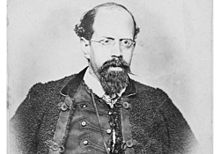Vicente Riva Palacio

Vicente Riva Palacio | |
|---|---|
 | |
| Born | Vicente Florencio Carlos Riva Palacio Guerrero October 16, 1832 |
| Died | November 22, 1896 (aged 64) |
| Nationality | Mexican |
| Occupation | Politician |
Vicente Florencio Carlos Riva Palacio Guerrero better known as Vicente Riva Palacio (16 October 1832 in Mexico City – 22 November 1896 in Madrid) was a Mexican liberal politician, novelist, journalist, intellectual, historian, and military leader.
His father was Mariano Riva Palacio, a moderate liberal, and his mother was María de los Dolores Guerrero Hernández, daughter of independence hero and President of Mexico Vicente Guerrero and María de Guadalupe Hernández.[1][2] Vicente's father worked for the Emperor Maximilian I of Mexico in Querétaro during the French intervention in Mexico,[3] but Riva Palacio led forces in defense of the Mexican Republic against the French-backed empire.
He was a mild positivist as he was enthusiast of the nineteenth-century idea of a beneficent material Progress achieved through science.[4] He had a linear conception of history where the ideologically and politically conservatists are equivalent to the forces of decadence and decay and the liberals are the promotors of the vigor and the progress of a country.[5] In respect to the discipline of history he established that this was a philosophical and critical activity which studies the great changes and evolutions of the different human groups.[6]
Life
[edit]In 1845 Riva Palacio entered college at San Gregorio, graduating in 1854 with a law degree. Riva Palacio was not only a lawyer but a general, diplomat, politician, historian and a writer. After Riva Palacio received his degree in law he continued working while going to war. Riva Palacio participated in the liberal Plan de Ayutla that ousted Antonio López de Santa Anna and fought against the French intervention in Mexico (1862–67). In 1858 and through April 1860, he was in prison because of his liberal ideas. After prison, he became member of the Chamber of Deputies, its President in 1861,[7] and wrote for the newspaper La Orquesta. In 1862, Riva Palacio became Governor of the State of Mexico. Then in 1865, he founded and published a newspaper called "El Pito Real". Also in 1865, he became Governor of Michoacán due to the death of General José María Arteaga, Riva Palacio was then named General and chief of the central army.[8] In 1867 he published another newspaper called "El Radical", which lasted until 1873. After El Radical he published another newspaper called El Hijo del Ahuizote. In 1876 he resigned as governor to dedicate himself to writing. During the dictatorship of Porfirio Díaz in 1884, he was accused of conspiracy and was imprisoned, where he wrote his second volume of what became the five-volume México a través de los siglos. After prison Riva Palacio retired from the military and left for Spain where he met Spanish artists and politicians. In 1896, Vicente Riva Palacio died in Madrid.[9]
Works
[edit]Riva Palacio published in several different genres: history, poetry, novels, and theatrical works. His writings have been the subject of scholarly study.[10][11][12][13][14]
- Novels
- Calvario y tabor
- Monja y casada, virgen y mártir
- Martín Garatuza
- Las dos emparedadas: Memorias de la Inquisición
- Los piratas del golfo
- La vuelta de los muertos
- Memorias de un impostor: Don Guillén de Lampart, rey de México
- Un secreto que mata
- Books of poetry
- Flores de alma
- Páginas en verso
- Mis versos
- Theatrical works written in collaboration
- Las liras hermanas
- Histories and criticisms
- Historia de la administración de don Sebastián Lerdo de Tejada
- Los ceros
- México a través de los siglos, v.2, El virreinato
- El libro rojo (in collaboration)
- Stories and legends
- Cuentos de un loco
- Cuentos del general
- Tradiciones y leyendas mexicanas (in collaboration)
- El abanico
References
[edit]- ^ José Ortiz Monasterio, "Vicente Riva Palacio y Guerrero" in Encyclopedia of Mexico, Chicago: Fitzroy Dearborn 1997, p.1281.
- ^ "Vicente Riva Palacio." Bicentenario Independencia. Diccionario Porrúa, Biografía y Geografía de México. n.d. Web. 08 March 2010.
- ^ (Bicentenaro par.1)
- ^ Ortiz-Delgado, Francisco Miguel (2020). La metafísica de los liberales. La historia y el progreso según Vicente Riva Palacio, Ignacio Manuel Altamirano e Ignacio Ramírez "El Nigromante". Aguascalientes, Mexico: Universidad Autónoma de Aguascalientes. p. 17. ISBN 9786078714520.
- ^ Ortiz-Delgado, Francisco Miguel (2020). La metafísica de los liberales. Aguascalientes, Mexico: Universidad Autónoma de Aguascalientes. pp. 35-37. ISBN 9786078714520.
- ^ Ortiz-Delgado, Francisco Miguel (2020). La metafísica de los liberales. Aguascalientes, Mexico: Universidad Autónoma de Aguascalientes. pp. 39-40. ISBN 9786078714520.
- ^ Enciclopedia Política de México 9 Tomo V. (PDF). Senado de la República - Instituto Belisario Domínguez. 2010.
- ^ José Ortiz Monasterio, "Vicente Riva Palacio y Guerrero", p. 1281.
- ^ "Vicente Riva Palacio Collection, 1790-1896 , Benson Latin American Collection, General Libraries, University of Texas at Austin". Retrieved April 30, 2010.
- ^ Monasterio, José Ortiz. Historia y ficción: los dramas y novelas de Vicente Riva Palacio. Universidad iberoamericana, 1993.
- ^ Leal, Luis. "Vicente Riva Palacio, cuentista." Revista Iberoamericana 22.44 (1957): 301-309.
- ^ Ponce, Ma Teresa Solórzano. "La novela teatralizada de Vicente Riva Palacio." Literatura Mexicana 7.2 (1996): 351-363.
- ^ Monasterio, José Ortiz. "Las novelas históricas de Vicente Riva Palacio." Secuencia 21 (1991): 019
- ^ Rangel, Dolores. "El proyecto de nación e identidad de Vicente Riva Palacio en Martín Garatuza." Espéculo: Revista de Estudios Literarios 43 (2009).
Further reading
[edit]- Giron, Nicole. "Ignacio Manuel Altamirano y Vicente Riva Palacio: una amistad con fondo de parentesco tixtleco." Secuencia 35 (1996): 007.
External links
[edit]- Works by Vicente Riva Palacio at LibriVox (public domain audiobooks)
